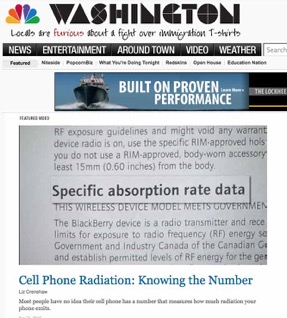Still Gloating Over Their AWS-3 Triumph Over Tranparency, Cellular Establishment Has a Disastrous PR Day
Then at 11 PM came the near 3 minute long piece by Liz Crenshaw entitled “ Cell Phone Radiation: Knowing The Number” that stressed the importance of selecting cell phones based on SAR - the number CTIA tried to keep hidden in the late 1990s. To be fair, the report said that cell phone manufacturers believe that as long as a phone meets FCC standards “there is no reason for concern”

Since CTIA is boycotting the whole City of San Francisco over its SAR disclosure ordinance, should they be consistent and take action now against WRC Channel 4 and possibly its parent, NBC Universal? But since NBC Universal, is in turn owned by GE (at least for the moment) shouldn’t they really retaliate against GE? No more cellular ads on NBC, Telemundo, USA, Bravo, etc. and all CTIA members forbidden to buy GE light bulbs. That’s how CTIA can show GE and its subsidiaries who they are trying to kick around! The citizens of SF are feeling the wrath of CTIA, GE should also.
But the next day, Tuesday, got even worse! After all, WRC Channel 4 is only a local TV station is Washington, the the Department of Transportation’s Distracted Driving Summit got national news coverage and 153,000 Google hits as of this writing. DOT reported that “in 2009, nearly 5,500 people died and half a million were injured in crashes involving a distracted driver. According to National Highway Traffic Safety Administration (NHTSA) research, distraction-related fatalities represented 16 percent of overall traffic fatalities in 2009”. Unfortunately, I can not find a quote from Mr. Walls on this issue, but I would be glad to append it if CTIA supplies it. (I would call them directly, but I am annoyed they have not acknowledged or responded to my recent public safety inquiry to 3 high officials there on the upcoming FCC prison/cell phone workshop webinar.)
Meanwhile CTIA’s policy on distracted driving appears to be this statement from their website:
CTIA-The Wireless Association® and the wireless industry believe that when it comes to using your wireless device behind the wheel, it’s important to remember safety always comes first and should be every driver’s top priority. While mobile devices are important safety tools, there’s an appropriate time and an inappropriate time to use them.
The wireless industry generally defers to consumers and the driving legislation they support – whether that’s hands-free regulations or bans on talking on their mobile devices while driving.
At the same time, we believe text-messaging while driving is incompatible with safe driving, and we support state and local statutes that ban this activity while driving.
We also agree with proposals that restrict or limit cellular use by inexperienced or novice drivers. Just as many states have graduated drivers' laws, such as restricting the number of passengers or nighttime hours of driving, the industry believes restricting a young driver's use of wireless while becoming better-skilled at the primary driving tasks makes sense.





![Validate my RSS feed [Valid RSS]](valid-rss-rogers.png)

